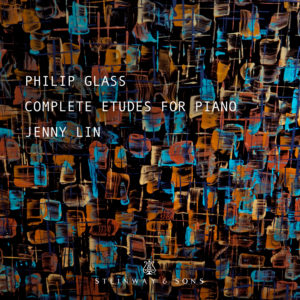-

Philip Glass Complete Piano Etudes
Jenny Lin, pianoRelease date : November 2017
Steinway & Sons -
-
Reviews:
“Pianist Jenny Lin’s commitment to new music and to working closely with leading composers of the 21st century shines through on her latest release for the Steinway & Sons label, Philip Glass’s Complete Etudes for Solo Piano. The two-disc album will be released November 20, 2017 and was recorded shortly after the New York premiere of the complete set of Etudes, in which Lin was one of the performers.
Glass composed the complete Etudes between 1994 and 2012, many for his own purposes as a solo recitalist. Eventually coming to terms with the fact that his compositional duties would preclude him from ever learning Etudes 11-20, which have a higher degree of difficulty, Glass conscripted nine other pianists from a variety of backgrounds to join him for the first live performances of all 20 Etudes. Jenny Lin was among the group selected, alongside Nico Muhly, Timo Andres, jazz virtuoso Aaron Diehl, frequent Glass interpreters Maki Namekawa and Sally Whitwell, and others. The New York premiere took place in December 2014 at Brooklyn Academy of Music. Lin continues to join Glass on the ongoing world tour of the Etudes.
While some of the Etudes were composed partially as pedagogical exercises for Glass to address deficiencies in his own playing, they nevertheless include “some of the most beautiful and inventive music of his late period,” according to WQXR. The Etudes reveal Glass’s deeply personal relationship to the piano, and Lin brings a similar attachment to her own interpretations of these modern classics.”
— Keyboard Mag
“Philip Glass’ 20 études for piano were written in two sets, with Glass himself as the intended performer. Like Chopin’s études, however, they are susceptible to an unusually wide range of possible interpretations. Jenny Lin has been close to Glass at various points in the works’ development, but this does not mean that she is obligated to follow his lead in terms of interpretation. Indeed, it’s the best possible news for his music that any prescriptions he may have laid down are now being discarded in favor of variety. Lin has performed on bills where the etudes are performed in a group to show their versatility. The etudes fit generally into Glass’ late style, introducing Romantic elements into a harmonically varied minimalist language. Lin offers some of the widest dynamic ranges to be heard on recordings of Glass’ keyboard and chamber music, and her performances are sweeping and powerful. Sample the spacious Etude No. 7, in which Glass’ music takes on real epic stature, or the quiet conclusion to the whole (the Etude No. 20). Lin made the recordings on four separate occasions, all at the acoustically superb Steinway Hall, and the études, like Chopin’s, were perhaps not meant to be played all together. Maybe this is a lot of Philip Glass at once, but the increasing variety of Glass recordings, beyond his own Orange Mountain Music label, is nothing but good news for lovers of his music, and this must be one of the strongest new entries in the field.”
—AllMusic Review by James Manheim